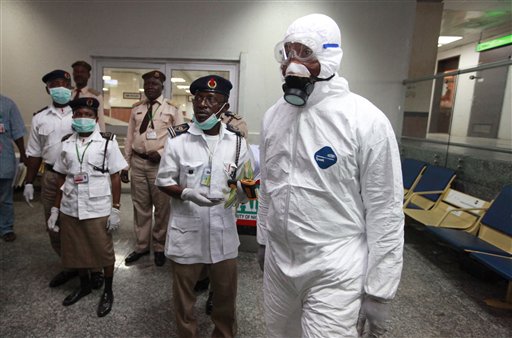
From the smallest rural towns to national capitals, Ebola has affected nearly every corner of Liberia, Guinea, and Sierra Leone. With the death toll near 1,000, health workers warn current statistics are low, as hostile residents flee medical professionals and threaten them daily with physical harm.
In Sierra Leone’s third largest city, Kenema, the city hospital is empty. People view the hospital “as a death trap,” due to the numerous fatalities. Albert J. Mattia, the deputy chief of the hospital’s burying team, said hardly anyone dies at the hospital. Instead, his team buries victims from the communities.
“People don’t die here now,” he said. “They are dying in the community, five, six a day. It’s very, very dangerous, very hazardous; it is contributing to the Ebola dead. You go to wards, there are no patients.”
Out of 1,711 Ebola cases, 691 of them are in Sierra Leone and 280 people died. But it is not just the patients who fear the hospital. The international organizations find it hard to convince doctors and nurses to work.
“There’s a perception in the population that it is a dangerous place,” said epidemiologist Philippe Barboza. ‘The farther one is from the hospital, the better. Even to have a meeting here is difficult.”
Daniel Bausch, an Ebola expert from America, traveled to the hospital. He witnessed contaminated areas and patients falling out of the bed.
“The floor was splashed with blood, vomitus, feces, and urine,” Bausch said. “You need a whole team to decontaminate the bed and lift the patient up off the floor and put him safely back in bed.”
Another American doctor, Joseph Fair, helped build the hospital. He considered Dr. Sheik Humarr Khan, one of the world’s leading Ebola doctors, and the head nurses as family. Unfortunately, all three passed away shortly after his arrival. Fair grieved the loss because these were the only people who ventured into the Ebola ward.
“The ones who have passed are the only ones who would go into the Ebola ward,” he said. “Now we have a huge void.”
In Liberia, hospitals are closed because the health workers are scared of contracting the virus. In Monrovia, Liberia’s capital, people leave the dead and dying in the streets. One burial team gathered seven bodies, but only two were in houses. Workers collected five bodies in the streets. To make matters worse, patients do not arrive at the hospital until they are in advanced stages when Ebola is highly contagious.
“It’s pretty scary,” said Doctors Without Borders logistician Alexis Moens. “This is a dangerous place. There’s no system; there’s no isolation. You make mistakes, you get infected.”
New Kru Town, a community just outside of Monrovia, is home to 50,000 people in makeshift shacks. The town has no plumbing or sanitation, leaving people to dispose of waste in the streets. The torrential rain in the area changes the ground “into one vast, warm, moist, breeding pool for germs.” Tamba Bundor leads a team of volunteers to visit each house to educate the people on basic hygiene. Afterwards, if the residents accept the advice, the workers mark the house with a blue cross. Many do not; there are some who believe people die from a curse, not Ebola. Dr. Bernice Dahn, Liberia’s chief medical officer, three people died in a church when Ebola started to spread. From The Telegraph:
Liberian hospitals, however, do not always inspire the kind of faith that people have in Liberian churches. A fortnight ago, one the main local health facilities, Redemption Hospital, was stoned by a mob after a woman died in there from a suspected Ebola case, following nationwide rumours that health workers were themselves passing on the disease. Today, the squat, single storey building offers redemption no more, having been shut down temporarily amid fears from staff for their own safety.
Safety is a concern too for Mr Bundor and his colleagues, who were attacked as they tried to visit the house of the bereaved family on Carpet Street.
The deceased’s relatives were insisting that their loved one had died as a result of a family curse – a cause of death that, in New Kru Town anyway, carries less social stigma than dying of an infectious disease like Ebola.
“The family of the victims were angry, saying it was a curse, not Ebola,” said Anthony Worpor, a member of Bundor’s team. “A crowd gathered, and some accused us health workers of spreading the disease ourselves. They even began touching a local journalist we had brought with us, saying: ‘if you think it is us spreading it, then here you are, we will infect you’.”
Health workers cannot trace the disease because people constantly move and hide. The disease itself also hinders investigations since a person is not contagious until symptoms appear, which could be two to three weeks after a person is infected. Even then, experts claim the patient does not spread the disease until the last few days. In a perfect world, a hospital monitors a patient for 21 days, but patients in Africa do not go because they fear they will never see their family again. Ben Neuman, a virologist at the University of Reading, believes the spread of the disease will slow in autumn since there are fewer outbreaks. However, there will be more deaths, a result of those currently infected having the viral disease reach its maturity.
“The sad thing is, the death rates are low right now,” said Neuman. “It takes a month for the infection to kill and a lot of other people are currently in the early stages. The things with this is infections tally up at the beginning, but deaths pile up at the end.”

COMMENTS
Please let us know if you're having issues with commenting.